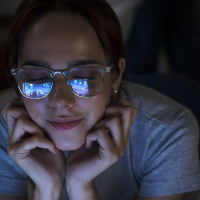
What is the aim of this review?
This Cochrane Review aimed to investigate the possible benefits and safety of blue-light filtering spectacle lenses, also known as blue-light blocking spectacle lenses, on visual performance, macular protection, and sleep quality. Cochrane Review authors collected and analysed all relevant studies to summarise the best available research evidence.
Key message
Blue-light filtering lenses may not reduce short-term eyestrain associated with computer work, compared to non-blue-light filtering lenses. Potential harmful effects were temporary and generally mild, and mostly thought to be related to the glasses more generally rather than specifically the lenses themselves.
There is a need for future research to provide evidence for the effects of blue-light filtering lenses on multiple aspects of visual performance and sleep, including vision level (best corrected visual acuity), ability to detect differences in shading and patterns (contrast sensitivity), colour discrimination, reducing glare due to bright light (discomfort glare), the health of the retina at the back of the eye (macular health), sleep measures (including blood melatonin levels and sleep quality), and patient satisfaction.
What was studied in the review?
The primary measures were the change in perceived and quantifiable assessments of eye strain, measured after at least one month of using the lenses. The other assessments considered a range of clinical measures and side effects.
What are the main results of the review?
We included 17 studies that recruited 619 people and took place in six countries. This review showed the following.
(i) There may be no short-term advantages with using blue-light filtering lenses to reduce visual fatigue with computer use, compared to non-blue-light filtering lenses.
(ii) There is limited information about the potential effect(s) of blue-light filtering lenses on visual acuity and the effects on sleep-related measures are unclear. The existing evidence regarding these measures is inconclusive.
(iii) None of the included studies investigated contrast sensitivity, colour discrimination, discomfort glare, macular health, serum melatonin levels or overall patient visual satisfaction; no conclusions could be drawn in relation to these measures.
(iv) There is some evidence that harmful effects that may be related to using blue-light filtering lenses include headache (1 study, 8%), increased depressive symptoms (1 study, 17%), lowered mood (1 study, 5%), and discomfort wearing the glasses (2 studies (combined), 22%), although similar adverse effects were also reported with non-blue-light filtering lenses and there were not enough data to accurately measure or determine possible harmful effects with certainty.
How up-to-date is this review?
The Cochrane Review authors searched for studies that had been published up to 22 March 2022.

